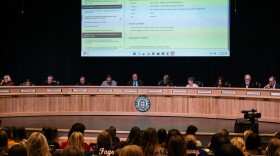The Lobster imagines a future where being single is not allowed. KPBS film critic Beth Accomando says the film is highly original but will leave many scratching their heads. The Lobster throws us into a dystopian near future where things are radically different. CLIP Hello I’m the hotel manager and this is my partner. Did you read the leaflet?... the fact that you will turn into an animal if you fail to fall in love with someone during your stay here is not something that should upset you. The Lobster is daring, bold and original. It never explains anything but rather leaves it to the viewer to piece together the details. It serves up a scathing commentary on relationships and society, and revels in the bleakest of black comedy. But sadly it can’t sustain its audacity for a two-hour run time. Beth Accomando KPBS News.
Companion viewing
"A Zed and Two Noughts" (1985)
"Dogtooth" (2009)
"Antiviral" (2012)
"The Lobster" (opening May 27 in select San Diego theaters) imagines a future where being single is not allowed.
"The Lobster" opens with a bizarrely random act: A woman drives up to a donkey in the middle of a field and shoots it dead. As a viewer you have no context for the act. There is no setup to explain her motives and no follow up to clarify her actions. It just happens and is punctuated by music that intensifies the sense of unease you feel.
Then we are introduced to David (and pudgy and bespectacled Colin Farrell). His wife has left him and he is checking into a hotel — of sorts. Writer-director Yorgos Lanthimos doesn't tell us much. He throws us into a dystopian near future and challenges the viewer to piece together what's going on. And initially it's exhilarating because so many movies spoon feed you information, telling you exactly how to feel or think every step of the way. But Lanthimos refuses.
After checking into the hotel, David meets the hotel manager (Olivia Coleman in a very different role from that in "Hot Fuzz" or "Broadchurch") who explains in flat emotional tones that "the fact that you will turn into an animal if you fail to fall in love with someone during your stay here is not something that should upset you."
Wait? Is she speaking figuratively or literally? And what does she mean about failing to fall in love? What the hell kind of hotel is this?
As the film progresses, we slowly gather information. It appears that the city does not allow people to be single and if you become single you are carted off to this hotel where you are expected to pair up with someone who shares a trait with you like a tendency for nosebleeds or a lisp or a limp. If you do manage to pair up at the hotel you are reintegrated into society. If not, you become an animal of your choice. Literally.

"The Lobster" is daring, bold and original. Lanthimos established himself as an original talent with his film "Dogtooth." Although the two films are very different in content, both create a sense of being dropped into another world that looks sort of like ours yet is radically different. In the case of "Dogtooth," three teenagers live in almost complete isolation from the outside world because of overprotective parents. In "The Lobster," it's a future world where society demands people live as couples.
The film is meticulously constructed and utterly deadpan in tone. Only Peter Greenaway ("A Zed and Two Noughts," "Drowning by Numbers," "The Cook, the Thief, His Wife, and Her Lover") comes to mind as a director who creates such precisely crafted and emotionally cool works. Both filmmakers construct their frames with exquisite care. Lighting, movement, furniture, placement of the actors, what's just out of frame — all these things work together to often create a sense of unease in the viewer. We can't quite put our finger on why we feel uncomfortable but we do, and that's exactly the effect they want to achieve.
In the case of "The Lobster," the style also conspires to deliver a scathingly black comedy about society and modern relationships. The emphasis on the need for people to live as couples and if things get rocky, have a child assigned to them to make things better, are merely exaggerations of attitudes that already exist. But it doesn't stop there. This is a film about extremes. So at one extreme is the hotel that demands pairing up and at the other extreme is a rebel society of loners that forbids coupling and exacts severe penalties for just kissing. David and a woman he meets that we only know as a short sighted woman (Rachel Weisz) try to carve out a middle ground between the two, but even they fall victim to ridiculous notions of what love is and what it means to be a perfect partner.
But "The Lobster" can't sustain its audacity for a two-hour run time. What felt so fresh in the beginning starts to grow tiresome in its repetition. Although Lanthimos does know the precise moment and way to finally end his tale.
"The Lobster" (rated R for sexual content including dialogue, and some violence) is a stylistically and thematically ambitious film that creates a perversely off-kilter world. There is much about this film that I love, and yet I can't embrace it fully. But I adore how Lanthimos creates a kind of ominous oppressiveness combined with a goofy absurdism. I'd rather be challenged and frustrated by Lanthimos than be spoon fed one of Hollywood's tame, formulaic products.






